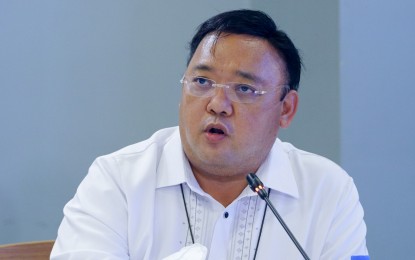
Presidential Spokesperson Harry Roque (File photo)
MANILA – Presidential Spokesperson Harry Roque on Wednesday expressed dismay that his nomination for a seat at the International Law Commission (ILC) is being “politicized.”
“It is very disheartening to have my nomination to the International Law Commission politicized, especially considering that the ILC itself is not a political body. Rather, it is an expert group of people who have the necessary credentials and experience in public international law needed to codify customary international law and develop the same,” Roque said.
He issued the statement after the University of the Philippines (UP) Diliman Executive Committee opposed his nomination to the ILC.
Roque, a former UP faculty member, said it was “unfortunate” that some members of the state university would tarnish his track record as “an advocate of human rights” for more than 30 years.
“For over 30 years, I have been an advocate of human rights, having spent most of my professional life as a member of civil society and as a public interest lawyer representing persons and sectors who have needed to be championed,” he said.
In a statement issued Tuesday, the UP Diliman Executive Committee expressed objection to Roque’s nomination to the ILC, saying the Palace official has a “very poor track record of promoting, defending, and fulfilling human rights and the rule of law,” especially during President Rodrigo Duterte’s tenure.
It added that Roque’s inclusion in ILC “would not serve its purposes but instead diminish the reputation of the body.”
The UP Diliman Executive Committee is composed of the chancellor, vice chancellors, deans and directors of colleges and schools, the university registrar, and three members-at-large elected by the university council.
Roque said he respects the rights of the committee to express grievances against his candidacy, as well as his decision to accept the Cabinet post as Duterte’s spokesperson.
He, however, said the UP Diliman Executive Committee’s “flimsy” justification to oppose his nomination and election to the ILC merely shows that there are some sectors who will do everything to besmirch his “good name, reputation and integrity” because of their differing “political beliefs.”
“It is unfortunate that some members of the UP academe would conveniently ignore and erase over 30 years of hard work and concrete accomplishments simply because our politics do not align,” Roque said.
He said it was “untrue” that he had a poor track record as a human rights advocate, adding that he represented the families of journalists killed in the 2009 Ampatuan massacre, the Panatag Shoal fishermen, the comfort women of World War II, and the families of alleged torture victim Darius Evangelista and transgender woman Jennifer Laude.
“In all these cases, I battled powerful interests in order to ensure that proper remedies were availed of, the rule of law was upheld, and justice was served,” Roque said.
He said he likewise “greatly furthered” the Filipinos’ human rights in recent years through the Universal Health Care Law, the Free Irrigation Service Act for small-scale farmers, a national lunch feeding program for students, and the Philippine HIV and AIDS Policy Act.
“All of these laws which I co-authored and whose passage I passionately lobbied for, grant our countrymen much-needed economic rights whose fruits we are now reaping during this pandemic,” Roque said.
Despite the UP Executive Committee’s supposed efforts to belittle his track record in human rights and ignore his credentials in the field of public international law, he said his commitment to human rights and the rule of law “has not wavered.”
Roque said his curriculum vitae “speaks for itself” with regard to his credentials in the field of public international law.
“Given the opportunity to be a member of the ILC, I have declared that I will be advocating for a treaty for vaccine equality among countries and a treaty recognizing as conclusive laws that identify territories of countries and ensuring maritime jurisdictions in the event of a rise in sea level driven by climate change,” he said.
The Philippine government has nominated Roque for the post at the ILC whose members are elected by the United Nations (UN) General Assembly.
Roque is among the 11 candidates from the Asia-Pacific region. Only eight seats are allotted for the Asia-Pacific States bracket in the UN body.
Election results for new ILC members will be announced during the 76th session of the UN General Assembly in November. (PNA)
